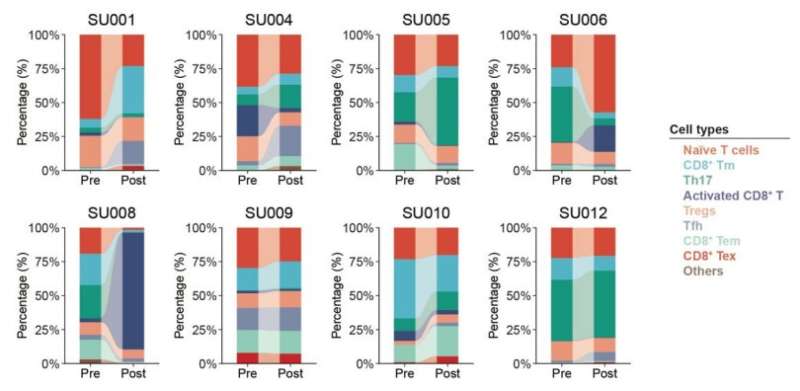April 3, 2023 feature
This article has been reviewed according to Science X's editorial process and policies. Editors have highlighted the following attributes while ensuring the content's credibility:
fact-checked
peer-reviewed publication
trusted source
proofread
Tumor-infiltrating T cells may be markers to predict patients' responses to cancer immunotherapy

New insights into a population of tumor-infiltrating T cells may ultimately allow doctors to predict how patients will respond to checkpoint blockade immunotherapy, a form of cancer treatment with advantages that doctors say could benefit a wider patient population.
This form of immunotherapy is an innovative strategy that relies on medications known as immune checkpoint inhibitors. The medications don't kill cancer; instead, they engage the body's immune system to recognize and attack malignant cells. This occurs by recruiting the immune system's T cells to destroy tumors. Keytruda, a medication that helped revolutionize the treatment of non-small-cell lung cancer, is a checkpoint inhibitor.
The trouble with these medications is that they're extremely effective for some people with cancer but don't provide durable responses for everyone. New research in China—like scientific investigations elsewhere in the world—is seeking ways to make this breakthrough form of cancer treatment effective for a broader population of patients.
Beyond lung cancer, doctors have used checkpoint blockade immunotherapy to treat patients with diverse forms of cancer—Hodgkins lymphoma, certain brain tumors, and breast, colon and bladder cancers.
The Institute of Cancer at Xinqiao Hospital in Chongqing, China has embarked on an ambitious study to better understand checkpoint inhibitor immunotherapy and ways to improve it.
Dr. Xinxin Wang and colleagues have analyzed the role of cytotoxic T lymphocytes—cancer-infiltrating T cells—in this form of immunotherapy. The team has simultaneously explored how to forecast a patient's response to the treatment.
In their research, based on mouse models, human tumor samples and patients undergoing treatment, the scientists discovered that their findings have helped them predict which patients will respond most vigorously to checkpoint inhibitor immunotherapy. The paper is published in the journal Science Translational Medicine.
Checkpoint inhibitor immunotherapy refers to treatments that help the body's T cells recognize and attack cancer. The therapy can emphasize any one of several "protein checkpoints" on healthy T cells or cancer cells: PD-1 and CTLA-4 stipple T cells and can act as "off switches" to prevent T cells from attacking healthy cells. PD-L1 is a protein checkpoint on cancer cells.
"Cytotoxic T lymphocytes in the tumor microenvironment are crucial for efficacious anti–PD-1/PD-L1 therapy and could serve as a predictor of successful immunotherapy in the clinic," asserted Wang.
The more cytotoxic T cells in the environs of the tumor, the greater the likelihood of robust anti-cancer activity, Wang and colleagues found.
Worldwide, some patients have been deemed cured after checkpoint blockade immunotherapy. Others, however, either fail to respond or quickly relapse. To design the best treatment plans, it's important to predict which patients will respond most vigorously to treatment, Wang and colleagues say.
With this in mind, the investigators analyzed single-cell RNA sequencing data from tumor-infiltrating cytotoxic T cells, gathered from eight patients with skin cancer. These data revealed that stronger responses and better clinical outcomes correlated with higher quantities of T cells that expressed the CD200 marker, which became more common after anti-PD-L1 therapy in the patient cohort.
"Here, we found an increase in tumor-infiltrating CD200+ cytotoxic T lymphocytes upon PD-1/PD-L1 blockade, with higher proportions of CD200+ T cells positively related to a favorable clinical outcome in three independent cohorts of patients with cancer," Wang noted.
In their animal studies, the scientists underscored that among mice with colon tumors, those with depleted CD200-T cells had worse outcomes. In the human cancer research arm of the study, researchers found that the degree of CD200+ T cell infiltration in tumor samples correlated with higher survival rates among patients. The group of patients had non-small cell lung cancer, invasive breast cancer, glioblastoma, and several other tumor types.
Wang and colleagues concluded their research by noting that more studies need to be conducted to define the mechanisms behind the antitumor properties of CD200+ T cells. They also say it's vital to study other checkpoint blockade treatments, such as anti-CTLA-4 therapy, which was not investigated in the current research.
More information: Xinxin Wang et al, CD200 + cytotoxic T lymphocytes in the tumor microenvironment are crucial for efficacious anti–PD-1/PD-L1 therapy, Science Translational Medicine (2023). DOI: 10.1126/scitranslmed.abn5029
© 2023 Science X Network



















